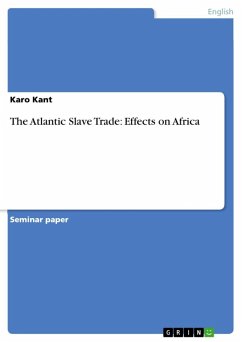Seminar paper from the year 2011 in the subject English Language and Literature Studies - Culture and Applied Geography, grade: 2,7, University of Kassel, language: English, abstract: In the sixteenth century, when Europe's interest in Africa moved away from deposits of gold to the need of work force, the Atlantic Slave Trade began. Because of expansion to the New World, Europeans needed reliable workers who were not suffering seriously from diseases and who were used to a tropical climate. After indigenous peopled had proved unreliable and unsuited, African people emerged as excellent workers because they were used to the climate, resistant to tropical diseases, and also hard working on plantations (Boddy-Evans). The Atlantic Slave Trade took place across the Atlantic ocean, from the Western coast of Europe where goods were brought to the Western part of Africa. Slaves were then shipped through the Middle Passage to the New World and were traded with goods, which were brought to Europe. The so-called triangular trade ended in the nineteenth century through the abolition of slavery. Considering the forced migration of African people, the continent suffered great losses. About 13 million people were shipped to the Americas. There are still debates as to how much the continent was, and still is, affected by the trade. Due to the fact that slavery was not new to Africans and the influx of goods, the continent gained material benefits. But the loss of people and, therefore, the loss of work force for the continent itself, prove that Africa still suffers from that period. In particular, continuous poverty and underdevelopment play a major role (Boddy-Evans). The following will be focused on the effects on the economy, society, and people in Africa due to the Atlantic Slave Trade. It will be clarified how Africa changed and how great the effects on African society were and still are today. A working paper on a conference about reparations will be included to illuminate today's extent of the effects.
Dieser Download kann aus rechtlichen Gründen nur mit Rechnungsadresse in A, B, BG, CY, CZ, D, DK, EW, E, FIN, F, GR, HR, H, IRL, I, LT, L, LR, M, NL, PL, P, R, S, SLO, SK ausgeliefert werden.









